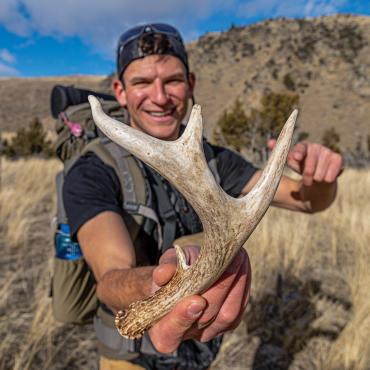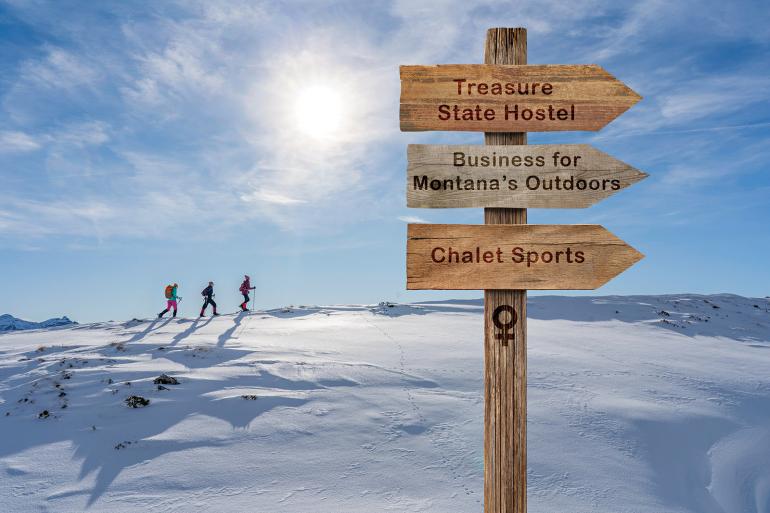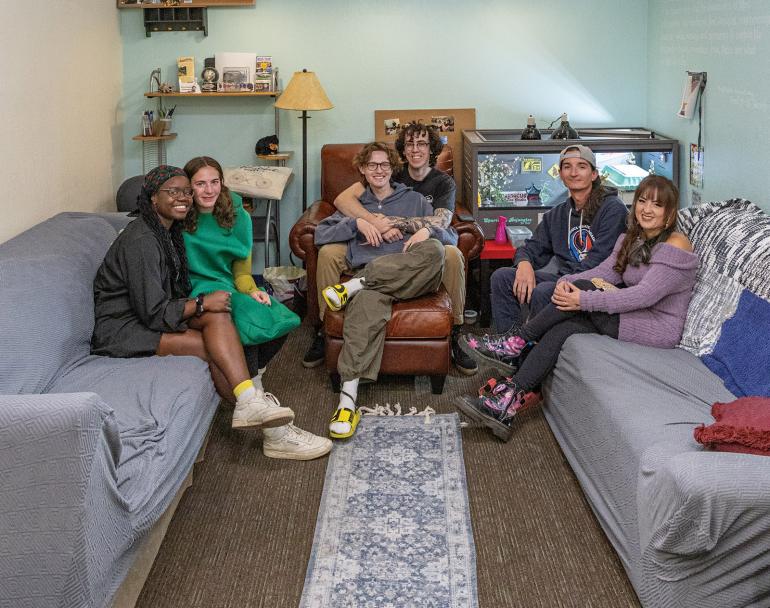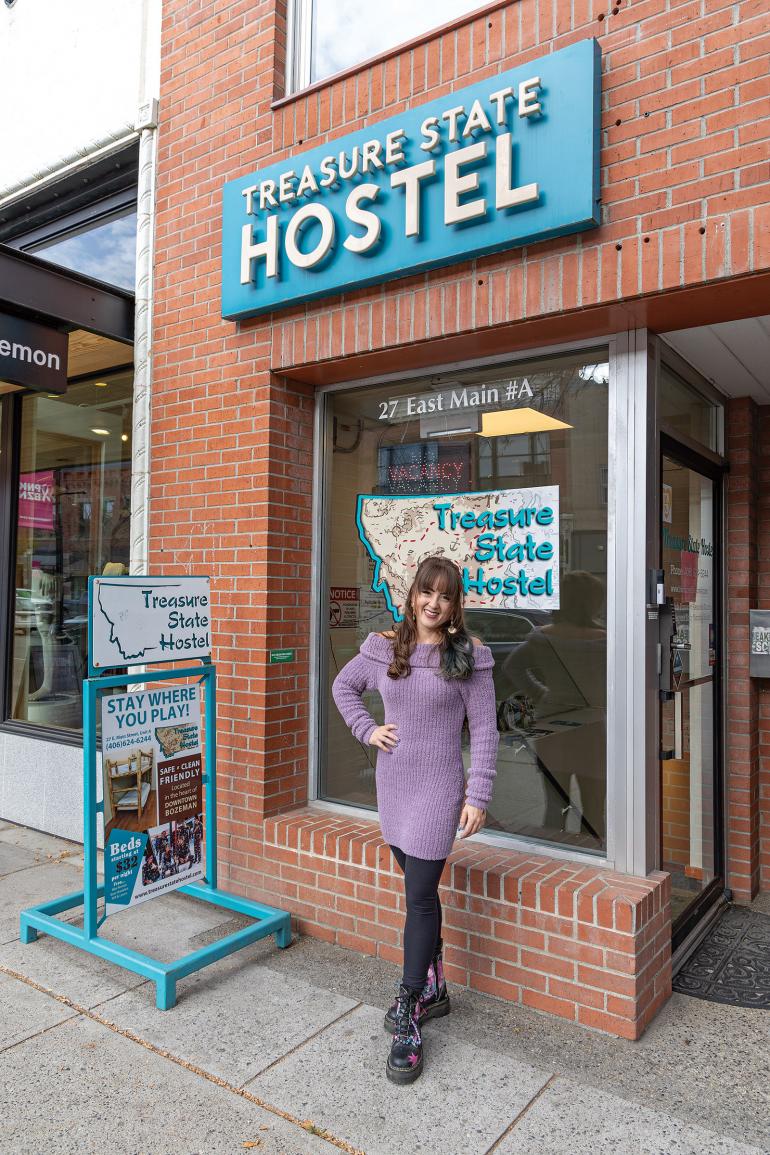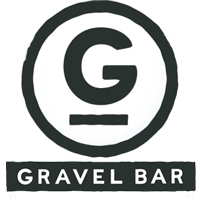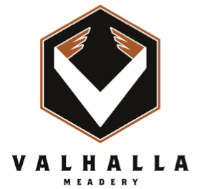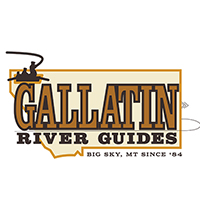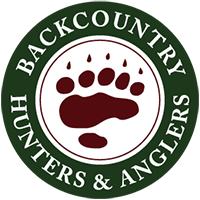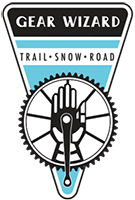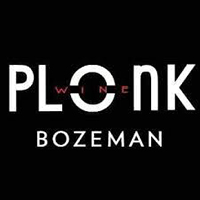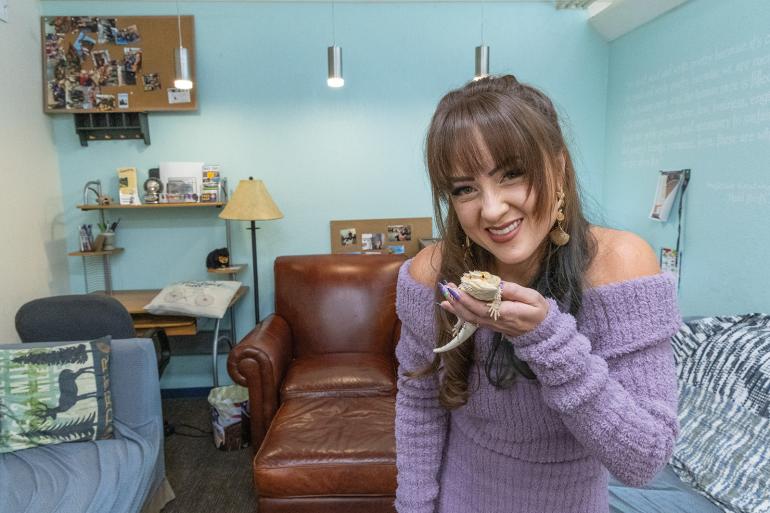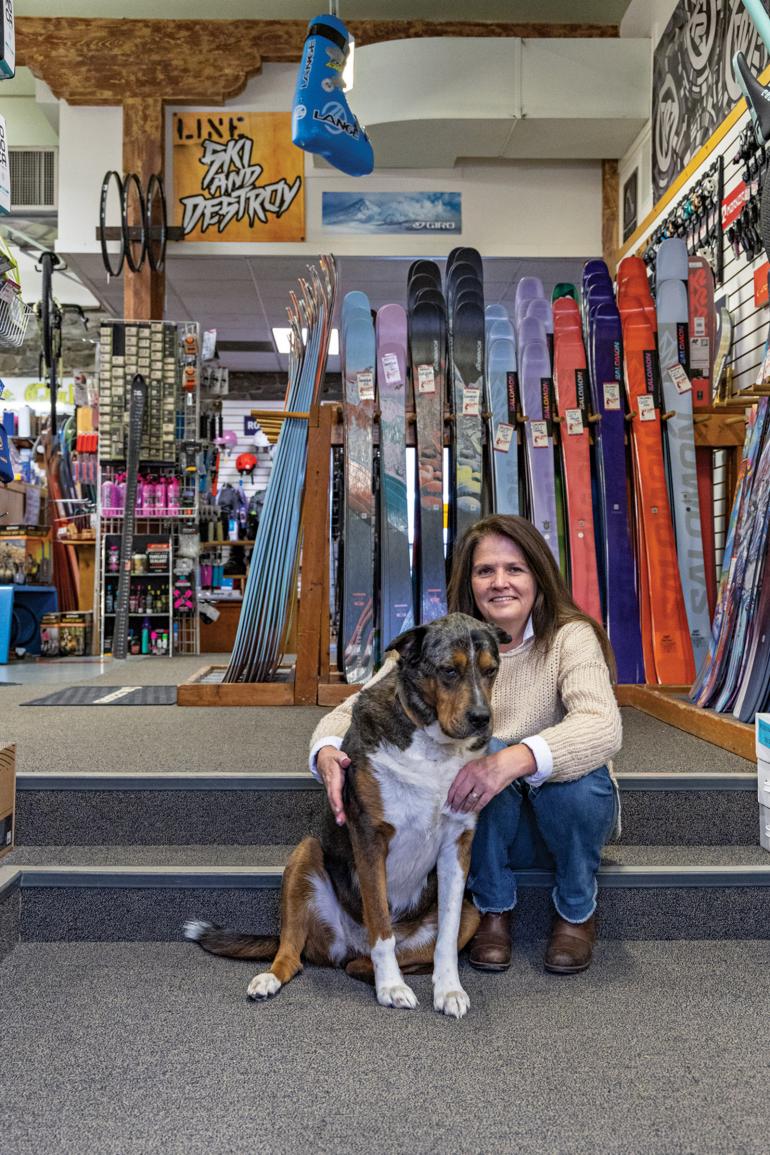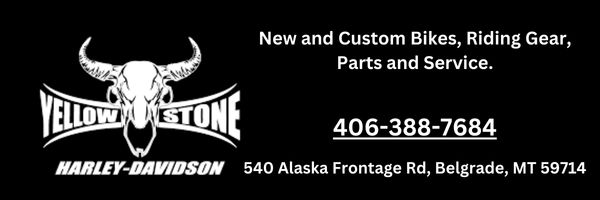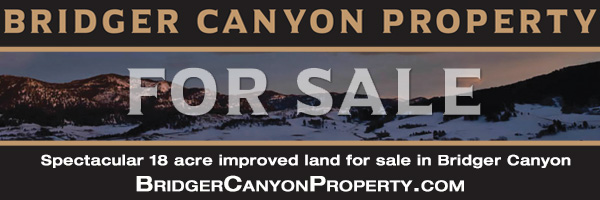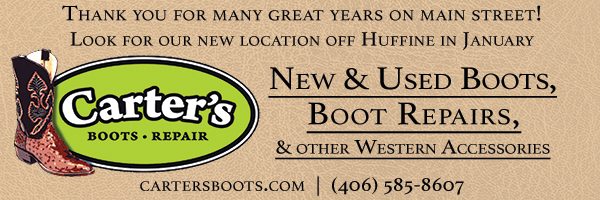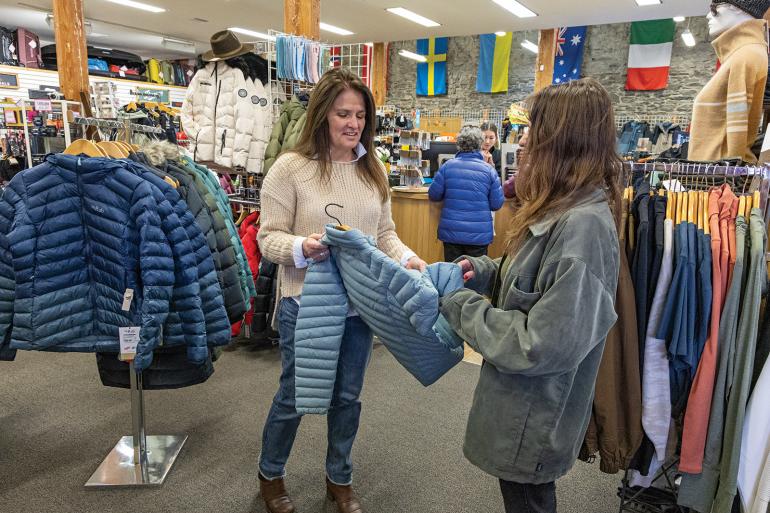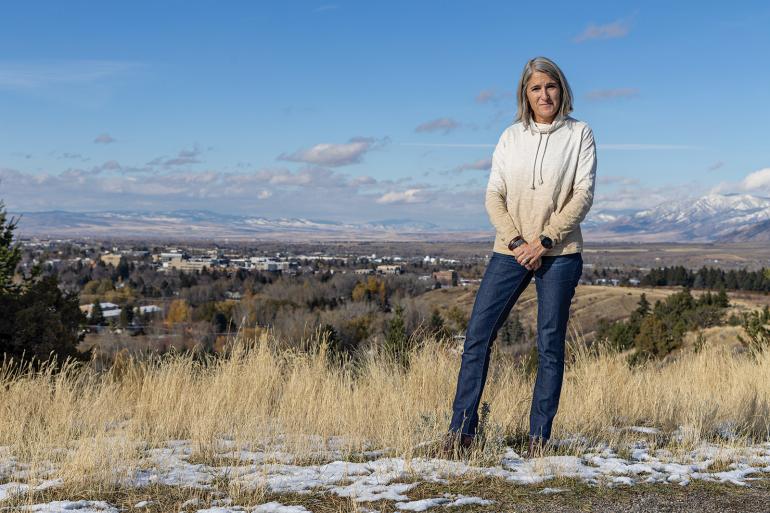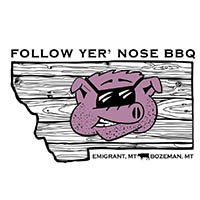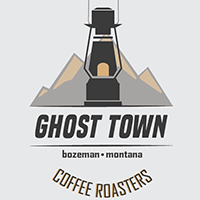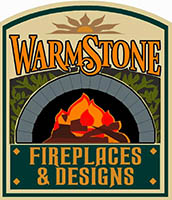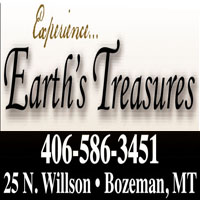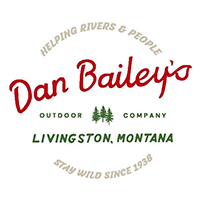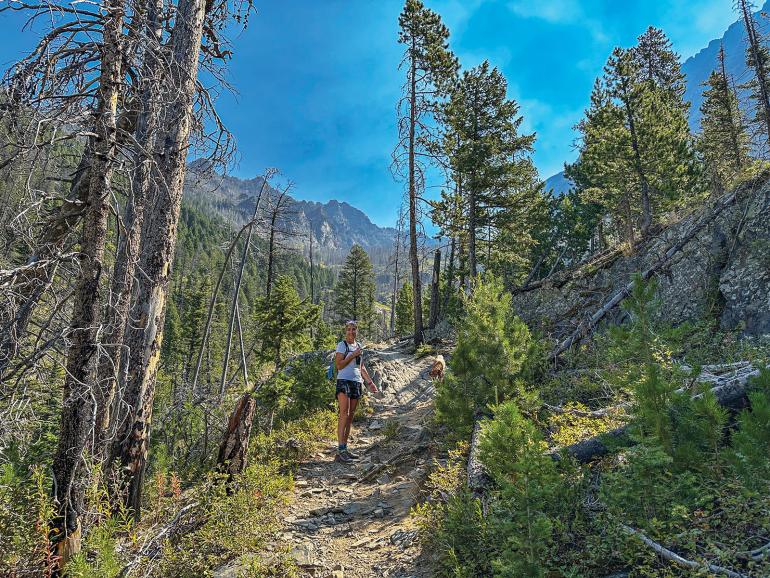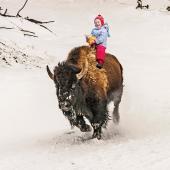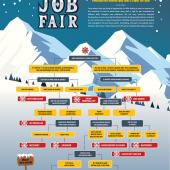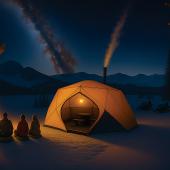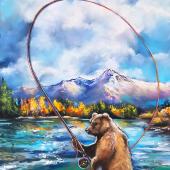A Common Interest
Behind the scenes with three local businesswomen.
Bozeman is a haven for outdoor business—after all, we’re more or less surrounded by mountains, rivers, forests, and abundant opportunities for adventure. But those kinds of entities don’t sprout up overnight. They take dedication, determination, and a huge amount of energy to build—not to mention, they rely on the region’s natural resources to keep a customer base intact. This winter, we caught up with three local women in the scene, all of whom have built operations based on Montana’s renowned outdoor recreation. These are just three of the many faces of our local outdoor-business community. —the editors
Outward Bound
Fostering a worldwide community of outdoor enthusiasts in a Bozeman basement.
by Carson Sprague
Nina Erickson Shaw, owner of the Treasure State Hostel, has always had an adventurous spirit. She says it comes from her mother, Kazuyo, who moved on a whim from Japan to Bozeman to attend MSU. It was the 1970s, and she was one of only four Asian students on campus. It was there she met her future husband, Paul Erickson, a fellow student and born-and-raised Montanan from Great Falls. They settled down in Belgrade, where Kayuzo found work as a gate agent at the airport. The Erickson family was well-traveled thanks to her flight benefits, often utilizing school breaks to visit international family and see the world.
Though Nina entertained the idea of going elsewhere for college, she ultimately decided to attend MSU. She lived at home, bartended on weekends, and danced on the Bobcat spirit squad. She saved money where she could to finance her true passion for traveling. It didn’t matter if anyone else was willing or able to go with her; she would go anyway. “I would fly on Delta for next to nothing and go travel the world.” she recalls. “Usually I was alone, so I stayed in hostels where I could meet people.”
We joke and ask ourselves ‘Where did all the people go?’ during the day, because they just check in and then immediately leave to go recreate.
As an alternative to hotels, hostels cater primarily to younger, more adventurous travelers by offering cheap, communal lodging—an ideal accommodation for those who want to explore all day and only need a place to sleep at night. Nina was captivated by the atmosphere of the hostels she stayed in and the sort of people she met on her travels. She realized that Bozeman, with its seemingly endless opportunities for outdoor recreation, would be the perfect place to open a hostel of her own. However, the idea seemed unrealistic and out of reach. She considered it an “astronaut dream,” and instead began to search for a more conventional career.
The jobs she applied for seemed unfulfilling, and worse yet, offered only two weeks of vacation each year—an insufficient amount of time for the adventures she had planned. What good was making money if you couldn’t spend it on what you love? After several months, she met with her parents, who asked if she could do anything, what it would be. The answer was obvious: start a hostel. “I didn’t think it was in the cards,” Nina recalls. However, her parents thought it was a fine idea and inspired her to keep her mind open and her eyes peeled for opportunities to make her dream a reality.
As luck would have it, a basement space downtown had recently been renovated for the very purpose of becoming a hostel, but the owner, Bill Butler, had unexpectedly died before the business’s full potential could be realized. Butler’s wife didn’t want to take over the task of running a hostel, and was looking to sell. With the help of her grandfather in Japan, Nina scraped together a down payment and changed the name to “Treasure State Hostel.” For three years, she lived in Room 16, keeping a constant bead on the hostel’s needs, ensuring everything ran smoothly.
During the peak tourist seasons, there is often no vacancy in the hostel.
Nine years later, the business is a well-oiled machine, an affordable accommodation tucked under Bozeman’s bustling downtown. “It frees up funds for travelers to go on fun excursions like fly fishing, or whitewater rafting, or skiing,” she explains. “We’re not for the people who want to stay inside a hotel the whole time. We’re for the travelers who come to get out and experience all that the Gallatin Valley has to offer.”
During the peak tourist seasons, there is often no vacancy in the hostel. “We’re at full capacity most nights, but it often doesn’t feel like that,” Nina says. “We joke and ask ourselves ‘Where did all the people go?’ during the day, because they just check in and then immediately leave to go recreate.” Aside from the obvious appeal of attractions such as Yellowstone Park, Bridger Bowl, and Big Sky, people come for the local festivals and concerts, such as Music on Main, Sweet Pea, and Ice Fest.
Of the latter, Nina recalls the story of two patrons; one from Argentina, the other from Arizona, who met at the hostel, remained in touch, and returned five years later to attend Ice Fest together. “That’s what I really love,” she says. “Those secondhand stories of friendship and community.”
“I always tell people that some of the best connections you’ll make at our hostel are not in our hostel. It’s meeting people at the breakfast table and deciding to go hike the M, or Drinking Horse, or going skiing. It’s getting outside of our four walls and into the sunshine.”
Nina carries a spark for life and speaks of the hostel’s inception with overflowing gratitude.
Nina no longer lives in the hostel, but instead resides with her husband in Belgrade. When not introducing guests to one another in hopes of inspiring grand adventures, Nina is an avid hiker and skier. “I trekked to the Everest Base Camp a couple years ago, and I love going on big hikes around the world,” she says. “But in recent years, I realized that I hadn’t done a lot of hikes in this area. So a lot of my current hiking is around Bozeman.”
Additionally, Nina serves on the board of directors for two nonprofits, one for Luccock Park in Paradise Valley and another called IndepenDance, an organization for adults who want to continue dancing and performing. She recommends that her employees find similar outlets for themselves, likening such activities to “sharpening your axe."
As far as Nina’s “axe” goes, it’s razor-sharp. She carries a spark for life and speaks of the hostel’s inception with overflowing gratitude. “A young woman fulfilling her dream of opening a hostel, not knowing anything of what she was doing?” she pauses to smile. “Everyone in the community has been so supportive, and I feel very lucky. Gratitude comes every time I think about it.”
A Friend In Town
Face-to-face service in the digital age.
by Georgia Bobo
If you walk into Chalet Sports on a weekday morning, you might find yourself greeted by Wrigley, wagging his tail to welcome you in, along with Jennifer Merkel Roethle, her mother Rita, and one or two smiling staff behind the checkout counter. You can’t help but look around and smile back yourself.
It may not be unusual to see a happy face around Bozeman, but it’s becoming more and more rare to meet a born-and-bred Bozemanite. Jennifer, however, traces back family multiple generations—which turns out to be an underlying theme for Chalet.
It all began when Gus Gnehm opened the original “Sports Chalet” in 1953. At the time, the Swiss immigrant and local ski instructor sold high-end skis to a growing Bozeman market. Rita and Larry Merkel, Jennifer’s parents, bought the establishment in 1977, making it their own while preserving the spirit of the name and continuing the premium service. Twenty years later, Jennifer was offered a managerial role and has been in the saddle ever since.
There’s always something to learn, Jennifer notes, whether that’s new fabrics, new waterproofing, new technology, or different fits—the outdoor industry is never at a standstill.
“I’ve learned a large majority from my parents and other people in the industry,” Jennifer says. With the support of fellow longtime business owners around the community, she finds herself learning daily. Specifically, she acknowledges the hard work that goes into maintaining a local Bozeman business amid a flux of tourists and part-time residents.
In high school, Jennifer worked with her parents at the family’s other Bozeman business, the Round House, along with two other jobs. Later, while studying at Gonzaga University, she worked at a ski shop. Back in Bozeman, she helped with the Wild West Shirt Company, and lastly, Cashman Nursery, before taking over Chalet. “I guess I never really left retail,” she reminisces.
Why would she? It’s interesting work, she says—each day brings a new challenge. One of those is staying up to date with customer needs, while keeping track of industry and market trends. “You want to treat each customer individually,” Jennifer says.
There’s always something to learn, she notes, whether that’s new fabrics, new waterproofing, new technology, or different fits—the outdoor industry is never at a standstill. Even well-known companies that have supplied gear and clothing for years can make big changes in materials, which means more learning for Jennifer and her staff. “You want to make sure that you have the tried-and-true brands, but also maybe some of those that are up-and-coming,” she explains. “And you always keep a lookout for the next hottest thing.”
She’s also looking out for ways to continue supporting her community. Growing up, Jennifer qualified for the Junior Olympics on Bridger Ski Foundation’s alpine team. Now, she gives back with the store’s “Junior Lease” program, which offers special, full-season rental rates for young skiers. In addition, she’s been on the board of the Downtown Bozeman Association, which has helped her maintain connection with the community, and brought business to her store—sometimes multiple generations’ worth. For example, one of the managers was recently fitting a kid for skis, when he realized that 20-some years ago, he had fitted that child’s mother as well.
In the age of impersonal digital shopping, it’s refreshing to know that there are people like Jennifer in our community—people who like to get after it, and people who know that personal interactions are the most effective way to connect with customers and serve their needs.
Jennifer, meanwhile, is a mother of three boys. Always putting family first, she and her husband have focused more on supporting their sons’ activities rather than their own, cheering on baseball, lacrosse, football, and wrestling matches on the weekends. Now, with the kids freshly out of the nest and onward to college and careers, Jennifer and her husband are finding their ways back to skiing and biking for themselves. “There’s nothing like being outside, especially being up on a hill first thing in the morning,” she notes.
In the age of impersonal digital shopping, it’s refreshing to know that there are people like Jennifer in our community—people who like to get after it, and people who know that personal interactions are the most effective way to connect with customers and serve their needs. The business model pays off for Jennifer. This past fall, a gal from Washington came into the store. She’d waited to shop for winter gear since she was last in town, five months prior—at which time she had visited Chalet and stocked up on summer gear. And it’s the same thing for the locals, Jennifer says: “If we make the right impression when they walk through the door, then when they need something for their bikes or their skis, they come back to us.”
Actually, it doesn’t matter to Jennifer if someone buys anything at all—after all, it’s about more than just business. “If somebody just needs directions to a trailhead, it’s still about making sure their needs are met,” she says. “And at the same time, getting to know them a little better.” After all, that’s how Jennifer and Chalet Sports measure success: in satisfied customers and new friends. Whether someone walks in the door looking for lip balm, head-to-toe gear, or just stumbles in for advice, the goal is to have folks leaving with those same smiles and wagging tails that greeted them upon entry.
An Outdoor Affair
The twin pursuits of business and recreation.
by Eli Fournier
When you picture the face of outdoor business, what does it look like? Storefront banners advertising alpine trail running? Emails plastered with pictures of big bucks and bulls, all trying to sell some gadget, pack, or boot? If that’s the case, you might be surprised to meet Marne Hayes. She’s not trying to sell anything to anyone. As the founder and director of Business for Montana’s Outdoors (BFMO), she represents a coalition of roughly 280 Montana companies that rely on the outdoors, to some extent, for their success.
Marne is well put together and has a calm demeanor. In classic Montana style, she prefers to meet people in person, which means she does a lot of driving—from her home just outside of Big Sky to communities all over the state. “It takes a little bit of planning to chip away at conversations in person,” she says. “But that’s where the magic happens. Emails and phone calls only do so much; it’s the face-to-face conversations that are really where people are more willing and interested to be engaged, to be more receptive.”
Unlike most business meetings, though, Marne’s not looking for money. Rather, she’s hoping for participation in BFMO, a business-engagement group that has a track record of advocating for public-land initiatives and access opportunities. In 2021, for example, BFMO led an economic-research report focused on how communities along the lower Yellowstone River might benefit from improved recreational access and infrastructure. Ultimately, the report helped garner enough support from the Montana Land Board to approve the acquisition of a 328-acre parcel for the North Wildcat Coulee Wildlife Management Area near Forsyth.
The partnership with Wild Montana opened up a channel through which businesses voices can be heard and leveraged to help protect our public lands.
Aside from participating in surveys and various programs, the things asked of a business in the organization could be anything from attending a public-lands rally at the Capitol, to expressing support—or dissent—for some kind of development, to providing input on legislation, such as the Blackfoot-Clearwater Stewardship Act. Currently, for instance, BFMO is working to gather business voices in opposition to the Black Butte Copper Mine at the headwaters of the Smith River—a project that could have a negative impact on the flow of recreational floaters and anglers (and therefore money) to the region. And while Marne hopes that businesses can contribute some amount of cash to the cause, she recognizes that commitments vary, depending on the size of the company and its available resources. Which is just fine, Marne says, because there are dozens of members that she could call on any given day with a proposal, event idea, or call to action, and they’d say, “Yes, sign me up; put my name on it; I’ll be there.”
BFMO, however, is far from alone when it comes to giving businesses a well-backed seat at the table. The organization, nowadays, flies under the wing of Wild Montana, but it hasn’t always been that way. When Marne first started BFMO in 2012, she sourced grant money from all over the place. At the time, she had just finished a decade working for the Big Sky Chamber of Commerce, and was presented with a contract project to gather local businesses that relied, to some extent, on access to public lands and recreation. The end goal, which took years, was to garner support for permanently reauthorizing the federal Land and Water Conservation Fund. In 2019, their efforts paid off and the fund was re-approved by congress with the Dingell Act. A few years later, Wild Montana approached Marne, essentially saying, We like the work you’ve done to build this coalition, and we’d like to see how we can keep it going, together. Because BFMO wasn’t incorporated as a 501c or nonprofit of any sort, Wild Montana took Marne on as a full-time contractor, allowing her the autonomy to continue what she was doing to build BFMO, but with the addition of the group’s funding and resources.
As far as the future goes, Marne is dedicated to building up BFMO even further. 'I don’t feel like the work is done yet,' she says.
Today, that support extends far beyond monetary backing. The partnership opened up a channel through which businesses voices can be heard and leveraged to help protect our public lands. “I came from a Chamber of Commerce background, so the business aspect was in my wheelhouse and was very comfortable for me,” Marne says. “The policy and conservation pieces when I started BFMO were the bigger learning curves, but I had a lot of really good people to pay attention to. The staff at Wild Montana—the Public Lands Director, the Conservation Director, the State Policy Director, the leadership team—they’re all extremely dedicated, very bright people who I continue to learn from every day. I take in what their priority work is, and it allows me to have more informed conversations with the people and businesses I engage with.”
Despite the initial learning curve, Marne seems perfectly in her wheelhouse nowadays. She’s outgoing, comfortable, and easy to talk to, all of which lead to trustworthy relationships right off the bat—a very Montanan way of doing business. As far as the future goes, she’s dedicated to building up BFMO even further. “I don’t feel like the work is done yet,” she says. “Maybe someday it’ll feel like I’ll be ready to do something else, but for right now, I’m pretty happy doing this.” Similarly, all of us hunters, anglers, hikers, bikers, climbers, and runners—among others—should be happy that Marne is working on the cause. Despite not having a brick-and-mortar location, BFMO is making an impact on Montana—one that we’re all benefiting from, business and individuals alike.


